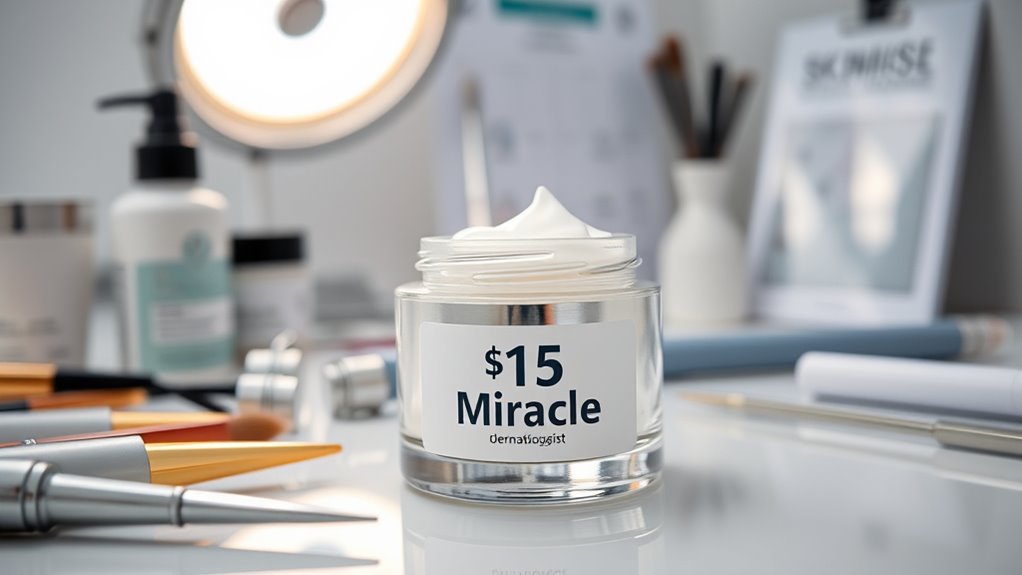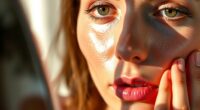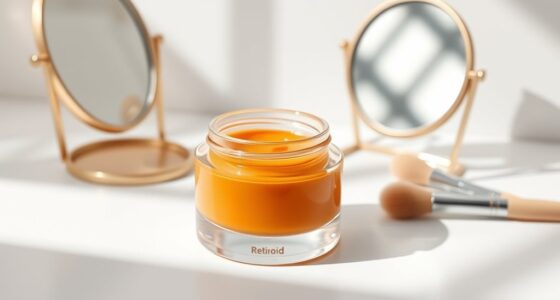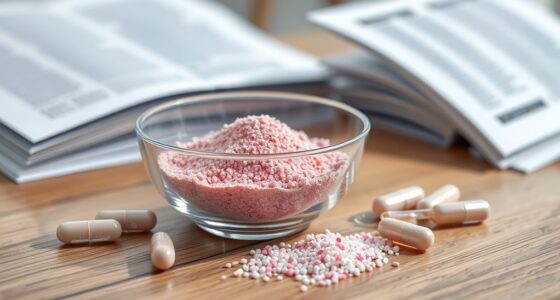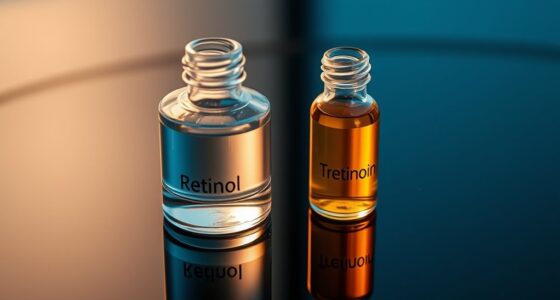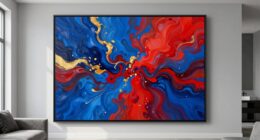Many dermatologists prefer a simple $15 product with proven ingredients like retinoids and sunscreen because it offers real results without the hype or huge price tag. Expensive creams often rely on marketing, premium packaging, and minor tweaks that don’t markedly improve skin. In fact, research shows that affordable, science-backed options can outperform luxury brands. Stick around, and you’ll discover why proven, cost-effective skincare is often the best choice for long-term skin health.
Key Takeaways
- Affordable active ingredients like retinoids and vitamin C are clinically proven to deliver effective skin improvements, making expensive creams unnecessary.
- Dermatologists prefer evidence-based products that offer predictable results without the inflated costs of luxury branding.
- Generic or drugstore sunscreens and treatments are as effective as high-priced counterparts for protecting and rejuvenating skin.
- Cost-effective, science-backed products allow consistent use and long-term skin health without financial strain.
- High-priced creams often rely on hype and marketing, whereas affordable options focus on proven ingredients with real efficacy.
The Cost of Skincare: What Makes Products Expensive?
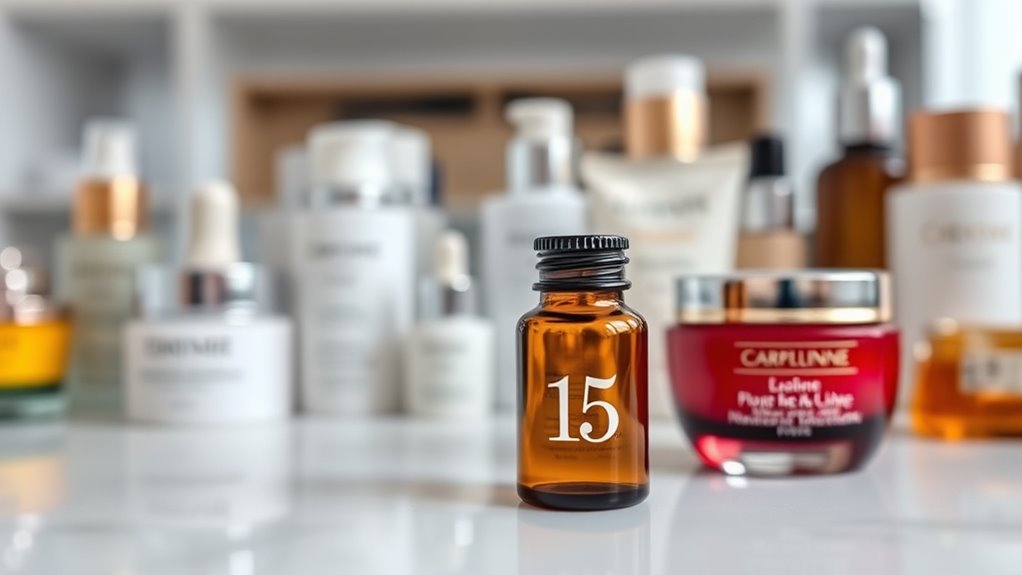
The high price of skincare products often reflects the significant costs behind their development. When you see luxury skincare, you’re paying for extensive research, clinical testing, and proprietary ingredients that boost production expenses. Marketing, branding, and packaging also add to the cost of skincare, as brands emphasize exclusivity and prestige to justify higher prices. Premium ingredients like stabilized antioxidants or bioengineered growth factors are expensive to source and process, further elevating product costs. Complex formulations and patented blends increase manufacturing expenses, making these products pricier than simpler options. Additionally, brand reputation and perceived efficacy influence pricing strategies, with many high-end brands charging a premium for luxury status. All these factors combine to drive up the overall cost of skincare products.
Evidence-Based Choices: Why Simpler Ingredients Often Win
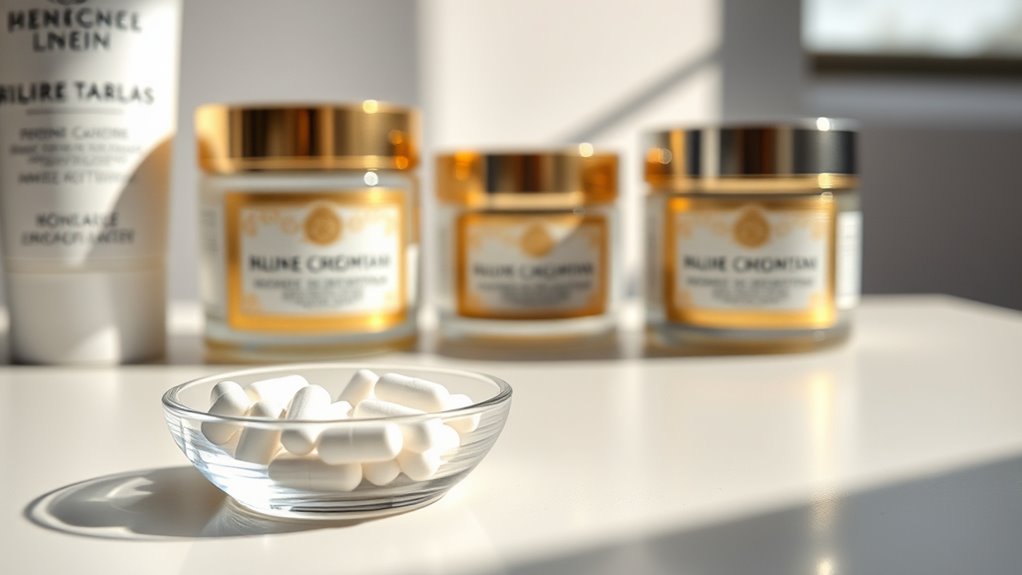
Many studies have demonstrated that active ingredients like retinoids and vitamin C derivatives are effective at lower concentrations, so you don’t need expensive, multi-ingredient formulas to see results. Evidence-based choices in skincare focus on proven ingredients backed by clinical research, rather than complex blends with unverified claims. Simpler formulations often outperform more complicated products because their ingredients are better understood in terms of stability and bioavailability. Dermatologists prefer recommending affordable, science-backed treatments because they have been validated through peer-reviewed studies, ensuring predictable results. Complex or luxury ingredients may lack rigorous clinical data, making their benefits uncertain. When you choose skincare rooted in evidence, you’re relying on ingredients proven to work, often at a fraction of the cost of high-end, multi-ingredient products. Additionally, understanding best anime movies can provide a relaxing distraction from daily skincare routines, highlighting the importance of balance and self-care. Moreover, selecting products with demonstrated efficacy can also help in wealth protection strategies, as investing in proven formulations minimizes the risk of ineffective treatments. Incorporating evidence-based ingredients into your routine ensures that your skincare efforts are both effective and economical.
The Power of Active Ingredients Like Retinoids and Sunscreen
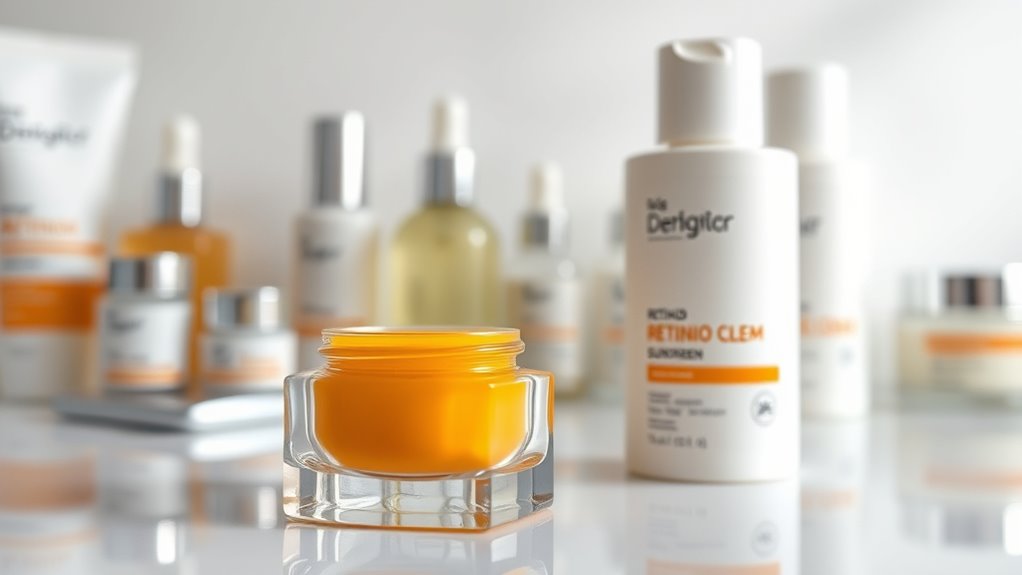
You can considerably improve your skin by using active ingredients backed by science. Retinoids boost collagen and speed up cell renewal, fighting signs of aging, while sunscreen shields your skin daily from harmful UV rays. Together, these simple yet powerful ingredients form the foundation of effective, affordable skincare. Incorporating glycolic acid, known for its ability to exfoliate and enhance skin radiance, can further amplify your skincare results. Engaging in consistent self-reflection about your skincare routine can help you identify what works best for your skin type. Additionally, understanding how essential oils can influence skin health through gentle, natural properties may provide complementary benefits in your routine. Practicing mindfulness during skincare routines can also promote a more positive and consistent approach to skin health.
Retinoids: Proven Anti-Aging
Retinoids stand out as one of the most proven and effective active ingredients in anti-aging skincare. They boost collagen production, reduce fine lines, and improve skin texture. Prescription options like tretinoin markedly enhance elasticity within 12 weeks, while over-the-counter retinoids like retinol provide gradual benefits at lower costs. Retinoids accelerate skin cell turnover, promote collagen synthesis, and prevent collagen breakdown, tackling multiple signs of aging. Regular use results in firmer, more elastic skin over time. Here’s a quick comparison:
| Retinoid Type | Potency | Benefits |
|---|---|---|
| Prescription | High | Faster, dramatic results |
| OTC | Moderate | Gradual, consistent improvements |
| Both | Collagen production | Anti-aging effects |
You can achieve professional results without expensive creams—retinoids are your secret weapon. Effective skincare ingredients play a crucial role in maintaining youthful skin.
Sunscreen: Daily Skin Shield
Sunscreen is a crucial component of any effective anti-aging routine because it shields your skin from damaging UV rays that cause premature aging. Daily skin protection with sunscreen can prevent up to 90% of this damage, making it indispensable for long-term skin health. Dermatologists often recommend affordable, broad-spectrum options like Daily Skin Shield, which contain active ingredients such as zinc oxide or avobenzone for reliable protection. Proper application is key—use about a teaspoon for your face and ensure all exposed skin is covered. While many high-end creams include SPF, dedicated sunscreens typically contain higher concentrations of active ingredients, offering better skin protection. Consistent daily use amplifies your anti-aging efforts and costs a fraction of expensive creams, making sunscreen a smart, simple step in your routine.
The Role of Antioxidants in Skin Health and Aging

Antioxidants play a crucial role in maintaining skin health and slowing the aging process by neutralizing free radicals caused by UV rays, pollution, and normal cellular activity. These free radicals damage collagen and DNA, speeding up skin aging. Using proven antioxidant ingredients like vitamin C, ferulic acid, and polyphenols helps protect your skin cells from oxidative stress, supporting long-term skin health. High-quality antioxidant products, such as SkinCeuticals CE Ferulic, are backed by research showing they reduce fine lines, boost firmness, and brighten skin tone. Stable formulations are essential because exposure to light and air can degrade antioxidant effectiveness. Proper storage and packaging are important to maintain antioxidant stability and ensure ongoing efficacy. The development of formulation stability techniques allows antioxidants to remain effective over time despite environmental challenges. Regular use of antioxidants strengthens your skin’s resilience, enhances sun protection, and visibly reduces signs of aging, making them a powerful addition to your skincare routine. Ensuring product stability through formulation and packaging is vital for maximizing their benefits over time. Additionally, understanding natural antioxidant sources such as organic fruits and vegetables can help integrate these powerful compounds into your diet for overall skin benefits.
How Marketing Influences Perceptions of Value
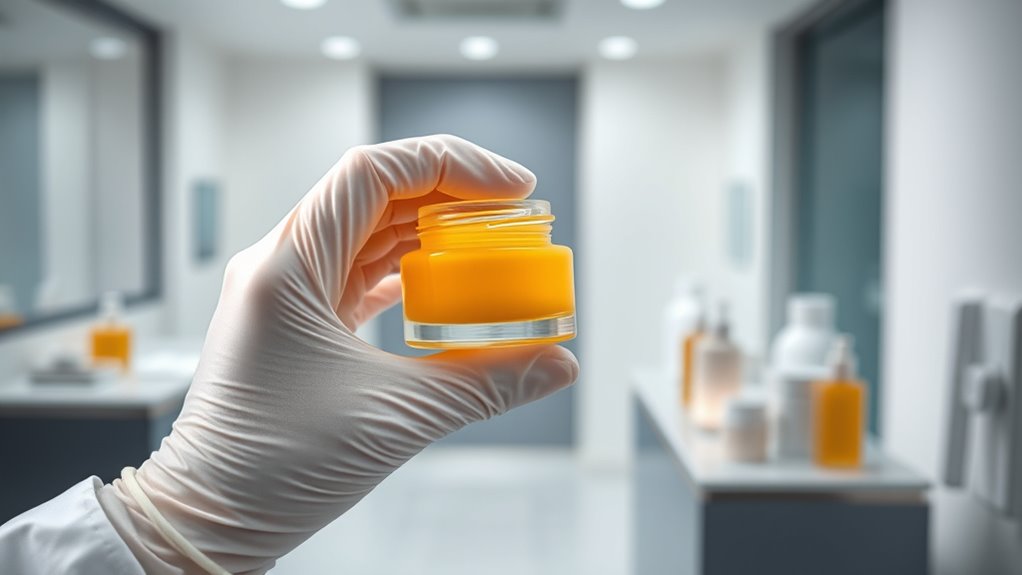
Marketing plays a powerful role in shaping how you perceive the value of skincare products. It creates the illusion that luxury branding, packaging, and celebrity endorsements mean higher effectiveness, influencing your purchasing decisions. Brands invest heavily in marketing, often spending more on promotion than research, which keeps prices inflated. Educational content from these brands emphasizes rare ingredients and exclusivity, making you believe you need expensive products for good results. This marketing strategy taps into your assumptions that higher prices equal better quality, even when clinical evidence shows affordable options can work just as well. Additionally, the prevalence of vetted skincare products that are both affordable and effective challenges the notion that expensive creams are superior. Recognizing the impact of marketing hype can help you make more informed choices about your skincare routine. Furthermore, understanding how perception of luxury influences buying habits can empower consumers to choose products based on actual efficacy rather than branding. As a result, your skincare routine may be driven more by marketing hype than actual product efficacy, leading you to prioritize expensive creams over simpler, equally effective solutions. Being aware of the difference between copyright and trademark protections can also help you identify authentic products versus counterfeit ones, ensuring you’re investing wisely. Moreover, understanding the role of spiritual energy and personal well-being can indirectly influence your confidence and overall satisfaction with your skincare choices.
The Limitations of High-Priced Creams and Topicals

High-priced creams often offer only small improvements and can’t replace professional procedures like Botox or fillers. Many expensive topicals rely on proprietary ingredients that lack solid evidence of superior results. You’ll find that affordable ingredients like retinoids and sunscreens can achieve similar or better outcomes without the hefty price tag.
Incremental Benefits Are Limited
While many people hope that spending more on skincare will lead to dramatic results, the truth is that most creams and topicals offer only minor improvements. These products provide incremental benefits that only slightly enhance your skin look, but rarely deliver significant changes. Even expensive creams often contain similar active ingredients as more affordable options, so their higher cost doesn’t guarantee better efficacy. The limitations stem from how your skin responds biologically and the ability of formulations to penetrate deeply. Over-relying on these creams can lead to diminishing returns, making it clear that they can’t replace professional treatments for substantial skin improvements. If you’re expecting dramatic transformations, you’ll likely be disappointed by the modest benefits high-priced products offer.
Topicals Cannot Replace Procedures
Although topical skincare products can improve skin texture and hydration temporarily, they can’t produce the immediate, targeted results that in-office procedures like Botox or fillers deliver. Topicals are limited to superficial effects and can’t address deeper structural issues like volume loss or sagging. Many anti-aging treatments, such as skin tightening or lifting, require invasive or minimally invasive procedures that topicals simply can’t replicate. High-priced creams may improve appearance briefly, but they lack the ability to stimulate collagen or elastin production deeply enough for significant, lasting change. Dermatologists often recommend combining procedures with topicals for the best results, emphasizing that creams support, but don’t replace, professional treatments. Ultimately, topicals alone won’t achieve the dramatic, targeted improvements you get from procedures.
Cost Doesn’t Equal Results
You might assume that spending more on skincare guarantees better results, but in reality, cost doesn’t always reflect effectiveness. High-priced creams often offer only small improvements and can’t replace professional treatments like Botox or fillers. Many affordable ingredients, such as sunscreens and retinoids, deliver proven results without the hefty price tag. The effectiveness of topicals depends more on their formulation, active ingredients, and correct application than on how much they cost. Plus, many expensive creams lack solid clinical evidence showing they deliver markedly better results than cheaper alternatives. Dermatologists know that affordable, evidence-based products can achieve comparable or even superior outcomes. So, spending more doesn’t automatically mean better results—sometimes, it’s just a costly misconception.
The Science Behind Affordable Alternatives That Work
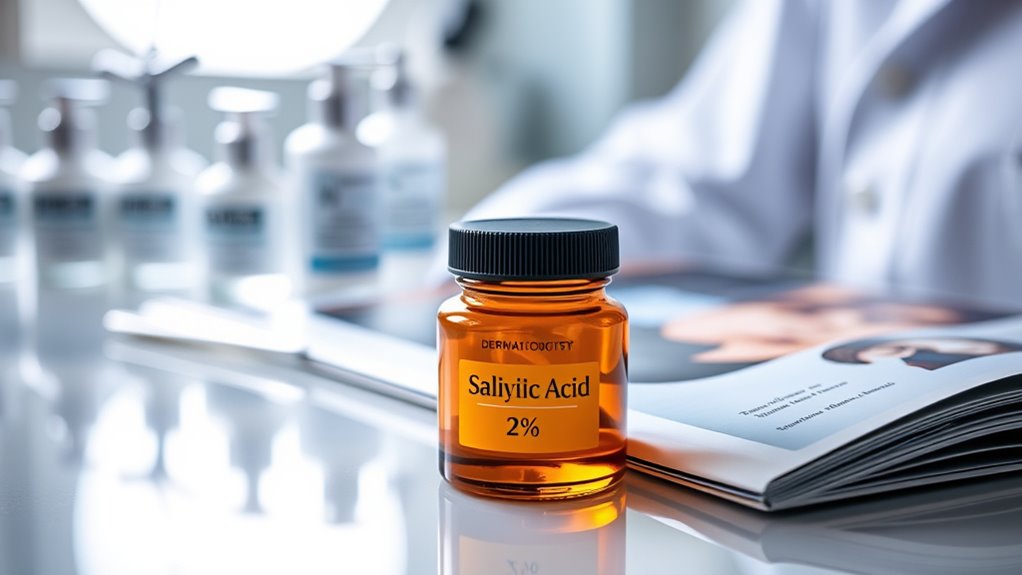
Affordable skincare products often contain the same scientifically supported ingredients as their pricey counterparts, making them effective options for improving skin health. Ingredients like niacinamide and retinol have extensive clinical research showing they boost skin cell turnover, improve texture, and reduce signs of aging. Generic brands often use the same active ingredients as luxury products but at lower costs, thanks to reduced marketing expenses. Well-formulated affordable options can deliver comparable antioxidant and collagen-boosting benefits, supporting healthy skin. Ingredients such as hyaluronic acid and vitamin C are proven to hydrate and brighten skin effectively, regardless of price. This scientific backing confirms that affordable alternatives can be just as powerful, leveraging the same growth factors and skin cell processes to enhance your skin’s appearance and health.
Why Dermatologists Prioritize Proven, Cost-Effective Products
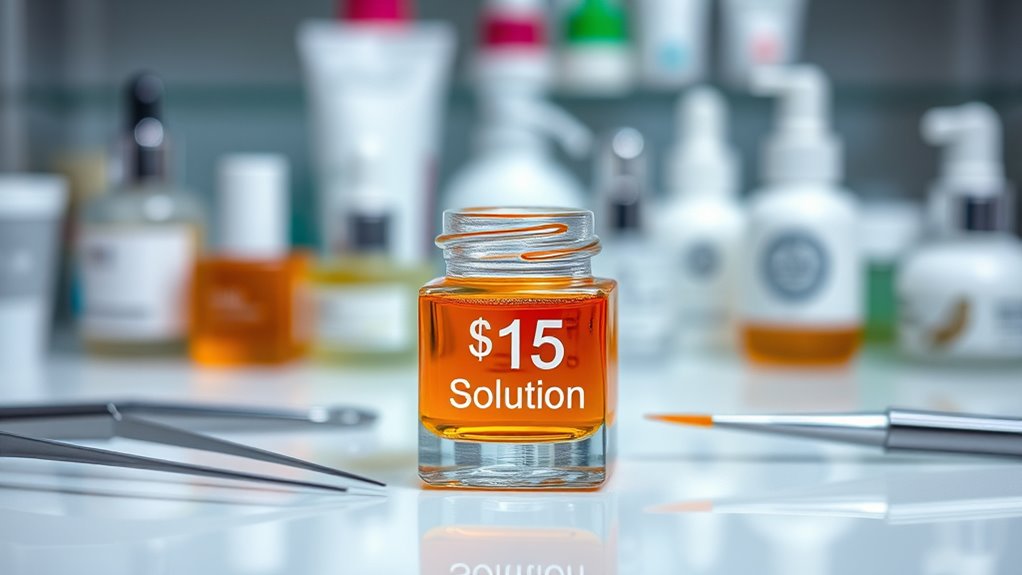
Dermatologists prioritize proven, cost-effective products because they rely on scientific evidence to guarantee safety and efficacy. They trust ingredients backed by clinical studies, such as retinoids, niacinamide, and glycolic acid, which deliver real skin benefits without the hefty price tag. Cost-effective options like tretinoin and generic sunscreens often outperform expensive creams in preventing and reversing signs of aging. Dermatologists focus on active ingredients supported by research rather than luxury branding or marketing hype. Using proven, affordable products ensures long-term skin health without unnecessary expenses. This approach allows them to recommend treatments that are both safe and effective, helping you achieve your skincare goals without overpaying for trendy or high-priced creams. Proven, cost-effective skincare is their trusted choice for real results.
The Impact of Consistency and Routine Over Price
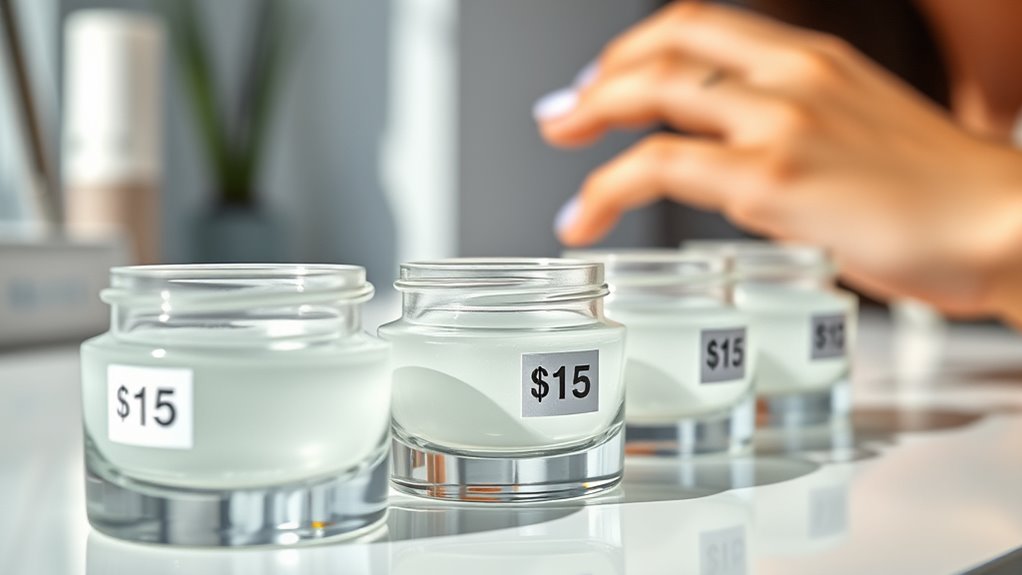
Consistency and routine often matter more than the price of skincare products. When you stick to a regular routine, even affordable products can deliver results comparable to high-end creams. Studies show that adherence to daily skincare habits produces more noticeable improvements than constantly switching between expensive and inexpensive options. Dermatologists recommend well-formulated, budget-friendly products because consistent application ensures ongoing skin benefits. Missing days or inconsistent use diminishes the effectiveness of any product, no matter its price. Routine habits like proper cleansing, moisturizing, and sun protection have a bigger impact than occasional use of costly treatments. Remember, it’s not about how much you spend but how persistently you follow your routine that truly transforms your skin.
Frequently Asked Questions
Do Expensive Face Creams Really Make a Difference?
You might wonder if expensive face creams really make a difference. In reality, their benefits often come down to marketing and packaging, not ingredients. Studies show that affordable products with active ingredients like retinoids and antioxidants work just as well when used consistently. So, instead of spending a fortune, focus on using effective ingredients daily, protecting your skin with sunscreen, and maintaining a good skincare routine for better results.
What Not to Say to a Dermatologist?
When talking to your dermatologist, avoid saying you want quick fixes or miracle cures, as they focus on long-term skin health. Don’t dismiss their advice or question their recommendations without valid concerns. Refrain from sharing unverified social media tips or anecdotal advice as if it’s proven. Also, avoid implying you’re only interested in cheap products; instead, express your genuine skin concerns openly and trust their professional guidance for the best results.
Is There Really a Difference in Medical Grade Skincare?
While it might seem like a subtle distinction, the difference in medical-grade skincare often lies in formulation and testing rigor. You’ll find that some affordable ingredients, like retinol or niacinamide, perform just as well as their pricier counterparts when used consistently. So, instead of focusing solely on price, prioritize products with proven ingredients and proper formulation—sometimes, simplicity and proper use trump luxury branding every time.
Do You Really Need Expensive Skin Care Products?
You don’t really need to spend a fortune on skincare. Many affordable products contain proven ingredients like retinol and vitamin C that work just as well as pricey creams. Expensive labels often rely on marketing and packaging rather than better results. Focus on simple, effective routines—daily sunscreen and retinoids—that are budget-friendly and backed by science. Your skin’s health isn’t about the price tag; it’s about consistent, targeted care.
What Is the Difference Between Cheap and Expensive Face Cream?
The main difference between cheap and expensive face creams lies in their ingredients and formulation quality. You might notice that pricier creams contain higher concentrations of active ingredients like antioxidants, retinoids, or peptides, which are more effective. They also use better delivery systems for absorption. Cheaper options often have fillers and lower-quality ingredients, making them less potent and requiring more frequent application for results.
Conclusion
Just like a lighthouse guides ships safely through storms, sticking to a simple, proven product keeps your skin healthy and bright. You don’t need to chase expensive creams that promise the moon; sometimes, the smallest, most reliable tool is your best ally. Focus on consistency and science, not price tags, and your skin will shine with confidence. Remember, true beauty isn’t about the price, but the steady light of a well-chosen routine.
